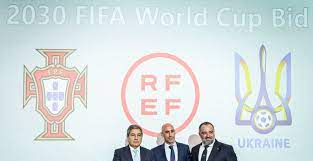By Andrew Warshaw
October 6 – In a radical move clearly designed at gaining widespread support amongst the FIFA membership, Spain and Portugal added Ukraine to their 2030 World Cup bid on Wednesday in what they hailed as an act of European solidarity.
The three-nation bid, supported by UEFA boss Aleksander Ceferin, was unusually announced at the European body’s headquarters in Switzerland.
Whilst that may on paper have been a canny public relations exercise, it backfired somewhat when no UEFA official was apparently on hand to take questions.
The joint candidates also missed a trick in terms of potential global exposure by opting not to have the high-profile media conference streamed remotely, meaning it could only be accessed by those attending in person.
Ukraine staged Euro 2012 with Poland and their federation president Andriy Pavelko said hosting World Cup matches in 2030 would be “the dream of people who survived the horrors of war or are still in the occupied territories and over whom the Ukrainian flag will surely fly soon.”
“We realise that Ukrainian people feel football (is) a good opportunity to come back to normal life.”
The partnership between Spain and Portugal, which also bid for the 2018 World Cup that went to Russia, was initially confirmed in June.
“Now it’s not the Iberian bid, it’s the European bid,” Spain FA boss president Luis Rubiales told Wednesday’s launch. “Together we represent the power of transformation football has in society.”
No details were provided about how many games at the 48-team tournament would be staged in Ukraine, several hundred miles away, or in which cities. “In the coming months, we will come to work on practicalities,” Rubiales assured those present.
Whilst the emotional pull of Ukraine being involved will be hugely popular among fans worldwide and many other stakeholders who have condemned the Russian invasion, whether it will be enough on a practical level to convince the majority of the 200-plus countries who vote in 2024 remains to be seen.
It is by no means certain whether Russia’s invasion will be over by then or, if it is, what Ukraine will look like. Voting in two years’ time for an event six years further down the road with no firm idea of how and where matches might be staged could pose serious difficulties.
However, Pavelko insisted bullishly: “The war will end, and we will organise World Cup 2030 matches together with Spain and Portugal at the highest level.”
And Portuguese president Fernando Soares Gomes da Silva added: “We are convinced that by 2030 we will have peace in Europe and that Ukraine will be able to host it (the tournament) in the best way possible.”
The elephant in the room facing the Iberian-Ukraine bid is a strong South American challenge from Argentina, Chile, Paraguay and Uruguay, who want to jointly stage the event to mark the centenary the inaugural World Cup in 1930, an equally significant emotional factor though for different reasons.
Additionally, Saudi Arabia, which has built close ties to FIFA president Gianni Infantino, has reportedly been preparing to host with Egypt and Greece though that is unlikely to gain much traction in Europe with UEFA steadfastly behind the Iberian-Ukraine candidacy.
Contact the writer of this story at moc.l1743793455labto1743793455ofdlr1743793455owedi1743793455sni@w1743793455ahsra1743793455w.wer1743793455dna1743793455

